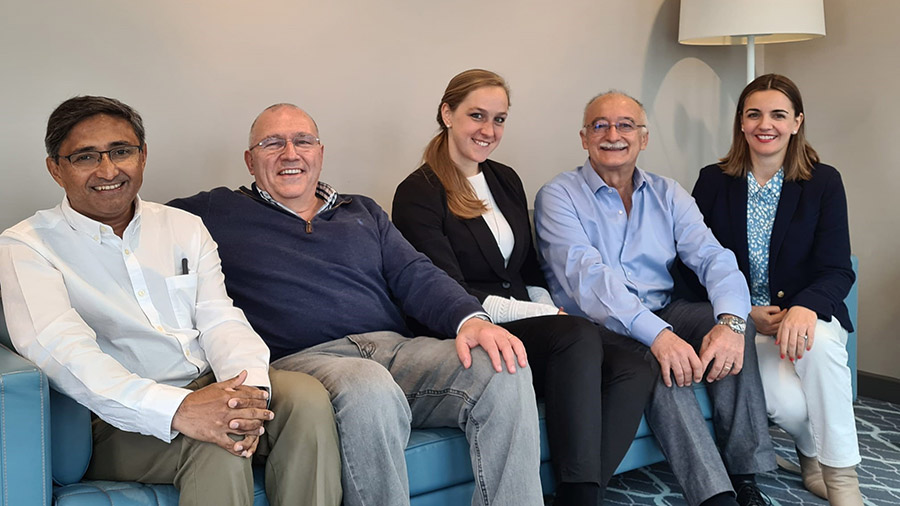Patient-centered training: AO CMF and IAOO join forces to pilot first-ever global oral cancer training program

The Oral Cancer Diploma Program Steering Committee and AO Staff (from left to right): Moni A. Kuriakose, Marcelo Figari, Franziska Dingendorf (Project Manager), Gregorio Sanchez Aniceto, Ginesa Aviles (AO CMF Education Commission Manager)
Oral cancer patients will be the ultimate beneficiaries of the world’s first global oral cancer training program for surgeons. AO CMF and the International Academy of Oral Oncology (IAOO) are joining forces to pilot the first modules of the program this year. AO CMF faculty member and IAOO Past President Moni Kuriakose and AO CMF colleagues Gregorio “Goyo” Sánchez Aniceto and Marcelo Figari explain the need and the unique expertise that the IAOO and AO CMF will deliver.
The global incidence of cancers of the lip and oral cavity is estimated at four cases per 100,000 people, according to the World Health Organization, and early-stage diagnosis can be a matter of life and death, improving the cure rate to about 80 percent. Focused on oral cancer management, the soon-to-be-launched Oral Cancer Diploma Program is a direct response to surgeons’ demand for knowledge and training on oral cancer—and that demand spans the specialties, from head and neck surgery to maxillofacial, plastic, ear, nose, and throat, and general surgery.
“There are a lot of requests around the globe for such training and knowledge,” Kuriakose says of the inquiries received by the IAOO. “It’s important that we partner with organizations such as AO CMF, which has tremendous experience in training surgeons in skills. The IAOO is a global organization with several experts around the globe with focused interest in oral cancer, management, biology, and research. AO CMF, on the other hand, has a long tradition of training surgeons.”
No such program currently exists, Kuriakose points out.
“What the Global Oral Cancer Diploma Program offers is focused, structured training specifically addressing surgical and clinical needs,” he says.
Joining forces to train surgeons
By joining forces, the two organizations are positioned to make an important contribution to patient care via surgeon training.
“Dr Moni Kuriakose…came to me with this proposal when I took over as chairperson of the AO CMF International Board three years ago,” says Sánchez Aniceto, calling the oral cancer training program “a fantastic initiative.”
Partnering to deliver training on oral cancer management is a natural choice for AO CMF, says Figari.
“Oral cancer is a pathological entity that is treated by many different related specialties…and all professionals treating oral cancer sometimes follow different procedures, methodologies, [and] rules,” he explains. “The intention of this program is to try to give them the most updated knowledge and expertise in order to properly treat patients—and to unify the approach to oral cancer treatment around the world.”
The program is a win-win for both the IAOO and AO CMF, Kuriakose, Sánchez Aniceto, and Figari agree.
“From the beginning, the program made sense because many members of the IAOO are also members of the AO CMF community,” Sánchez Aniceto adds. “Because of its multispecialty background and vast educational experience, AO CMF is able to provide all of its resources and the curriculum we have previously deployed on the topic, including reconstruction.”
The program takes shape
The new program—to be piloted in August 2022 with four modules—in total comprises ten modules covering the very basics such as oral carcinogenesis and cancer prevention all the way through to pretreatment studies, treatment, the surgical therapy, adjuvant methods, and post-therapy follow-up.
“So, participants will be exposed to the complete and broad scope of this very significant pathological entity that is oral cancer,” Figari says, noting that the full program will take about twelve months for participants to complete.
The program will be delivered primarily online with both synchronous and self-directed, asynchronous parts, Kuriakose says. The asynchronous portions take place on an online platform, giving diploma candidates the opportunity to work at their own pace, based on their existing level of knowledge. Synchronous training will be carried out with the support of local as well as global faculty, providing learners with a chance to discuss their thoughts and concerns with globally acclaimed faculty, who will act as a sounding board to impart their knowledge.
Patient-centered training
Across all the modules, multidisciplinary patient care is built into the program. Champions of the Global Oral Cancer Diploma Program foresee the global, ten-module launch in 2023.
“We have a structured the modules following the patient journey,” he says. “So, we will be following the basics of the pathology, then the diagnosis, then the potential treatment, and then the decision making among the specialties involved, and then the treatment and the follow-up at all those levels: The base, the care provider, will be exposed to the program and will be improving his or her capabilities in dealing with the patients. We are also planning a module on communication; this is something quite relevant when caring for cancer patients.”
With the patient journey at its center, the program is expected to advance the AO mission of promoting excellence in patient care and outcomes.
“The entire training benefits the end user; that is, the patient,” Kuriakose says. “Patients will get comprehensive, holistic care.”
